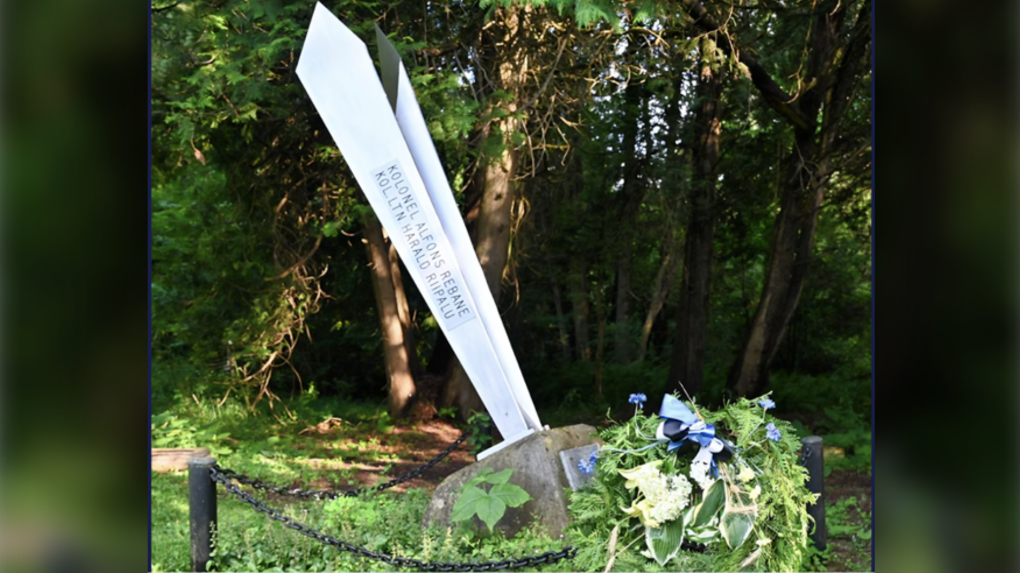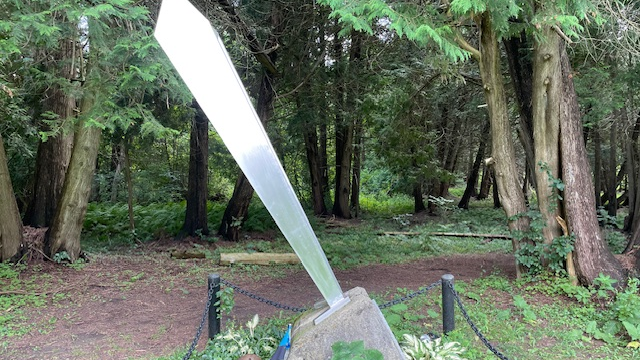Ont. monument to Estonian soldiers questioned over Nazi connection
Concerns have been raised about a Second World War monument at an Estonian summer camp in Elora, Ont.
A Jewish human rights organization got a tip six weeks ago about the display at Seedrioru, which included the names of four soldiers who fought with the 20th Waffen Grenadier Division of the Nazi SS.
According to the Friends of Simon Wiesenthal Center for Holocaust Studies, the men also received the Knight’s Cross of the Iron Cross, one of Germany’s highest military honours.
“Those four individuals are among the highest ranking, most celebrated SS members,” explained Jaime Kirzner-Roberts, the organization’s senior director of policy and advocacy. “It names nobody else. I’m not sure on what basis they say that it honours anyone but those four SS members.”
The centre reached out to Seedrioru about the children’s exposure to the monument. Afterwards, they claim, photos from the camp’s website and social media accounts were removed, along with references to Colonel Alfons Rebane, Lieutenant Colonel Harald Riipalu, Major Paul Maitland and Harald Nugiseks.
 Photo of the Seedrioru monument shared by Friends of Simon Wiesenthal Center for Holocaust Studies. (Source: 2024 Suvihari Festival Photos)
Photo of the Seedrioru monument shared by Friends of Simon Wiesenthal Center for Holocaust Studies. (Source: 2024 Suvihari Festival Photos)
“We found photos, as recently as three weeks ago, of children laying wreaths at the monument,” Kirzner-Roberts said. “Unfortunately, it appears that their only concern was hiding the information by erasing it. They did not get back to us at that time. So suffice to say, we were disappointed with that.”
Camp officials said the monument was erected during the Soviet occupation of Estonia in the 1980s and it honours fallen soldiers from the Second World War.
“The intention of this monument is about Estonians fighting for their freedoms and, at the base of the monument, there’s a quote that says: ‘Fighting for our Homeland,’” explained camp director Leila Hess. “It has nothing to do with the names.”
The Seedrioru summer camp has been in operation for nearly 70 years and is focused on preserving both the Estonian language and customs.
Officials there said the Estonian and Jewish communities share a common hatred of all totalitarian regimes.
“They don’t support Nazis [but] they have a statue celebrating Nazis on there? I don’t know how to make sense of that,” Kirzner-Roberts responded.
The camp said children have laid flowers at the monument as a way to remember those who died defending their country, but it is not meant to honour Nazis.
“In my opinion, bringing children to a monument honouring perpetrators of Nazi war expansionism and genocide, and telling those children that these are great men deserving to be honoured, to me that is clearly a form of indoctrination,” said Kirzner-Roberts.
During the Nuremberg trials, it was established that Estonians who served under the Nazi banner were conscripts, fighting to protect their homeland from Soviet occupation.
Kirzner-Roberts disagrees with that ruling.
“Not conscripts. These were active, willing military leaders who willfully implemented the near extinction of Estonian Jewry,” she said.
A University of Waterloo professor explained that nationalist displays generally don’t provide the necessary context.
“If the Estonian community feels that that monument is so important to their community and their sense of identity, then that community needs to ask itself how it clashes with other communities’ sense of identity, and what they may have suffered at the same time,” said James M. Skidmore, chair of the Germanic and Slavic studies department at UW.
The names of the four soldiers, and emblems of their unit, have since been removed from the display.
 Monument at Seedrioru, an Estonian summer camp in Elora, Ont. on July 31, 2024. (Dave Pettitt/CTV News)
Monument at Seedrioru, an Estonian summer camp in Elora, Ont. on July 31, 2024. (Dave Pettitt/CTV News)
“The names are no longer on our monument because that’s not what it is for at all,” said Hess.
She added that it’s the first step in refocusing her country’s complex history, which included multiple wars and foreign occupations.
Kirzner-Roberts has spoken with camp officials. While she wants to continue working towards reconciliation, she said they won’t be able to find common ground until the camp acknowledges that being a Nazi leader is inexcusable.
Hess, meanwhile, said she’s always considered the monument a representation of Estonians fighting for their freedom.
CTVNews.ca Top Stories

Trump threatens to try to take back the Panama Canal. Panama's president balks at the suggestion
Donald Trump suggested Sunday that his new administration could try to regain control of the Panama Canal that the United States “foolishly” ceded to its Central American ally, contending that shippers are charged “ridiculous” fees to pass through the vital transportation channel linking the Atlantic and Pacific Oceans.
Man handed 5th distracted driving charge for using cell phone on Hwy. 417 in Ottawa
An Ottawa driver was charged for using a cell phone behind the wheel on Sunday, the fifth time he has faced distracted driving charges.
Wrongfully convicted N.B. man has mixed feelings since exoneration
Robert Mailman, 76, was exonerated on Jan. 4 of a 1983 murder for which he and his friend Walter Gillespie served lengthy prison terms.
Can the Governor General do what Pierre Poilievre is asking? This expert says no
A historically difficult week for Prime Minister Justin Trudeau and his Liberal government ended with a renewed push from Conservative Leader Pierre Poilievre to topple this government – this time in the form a letter to the Governor General.
opinion Christmas movies for people who don't like Christmas movies
The holidays can bring up a whole gamut of emotions, not just love and goodwill. So CTV film critic Richard Crouse offers up a list of Christmas movies for people who might not enjoy traditional Christmas movies.
More than 7,000 Jeep SUVs recalled in Canada over camera display concern
A software issue potentially affecting the rearview camera display in select Jeep Wagoneer and Grand Cherokee models has prompted a recall of more than 7,000 vehicles.
'I'm still thinking pinch me': lost puppy reunited with family after five years
After almost five years of searching and never giving up hope, the Tuffin family received the best Christmas gift they could have hoped for: being reunited with their long-lost puppy.
10 hospitalized after carbon monoxide poisoning in Ottawa's east end
The Ottawa Police Service says ten people were taken to hospital, with one of them in life-threatening condition, after being exposed to carbon monoxide in the neighbourhood of Vanier on Sunday morning.
New York City police apprehend suspect in the death of a woman found on fire in a subway car
New York City police announced Sunday they have in custody a “person of interest” in the early morning death of a woman who they believe may have fallen asleep on a stationary subway train before being intentionally lit on fire by a man she didn't know.


































